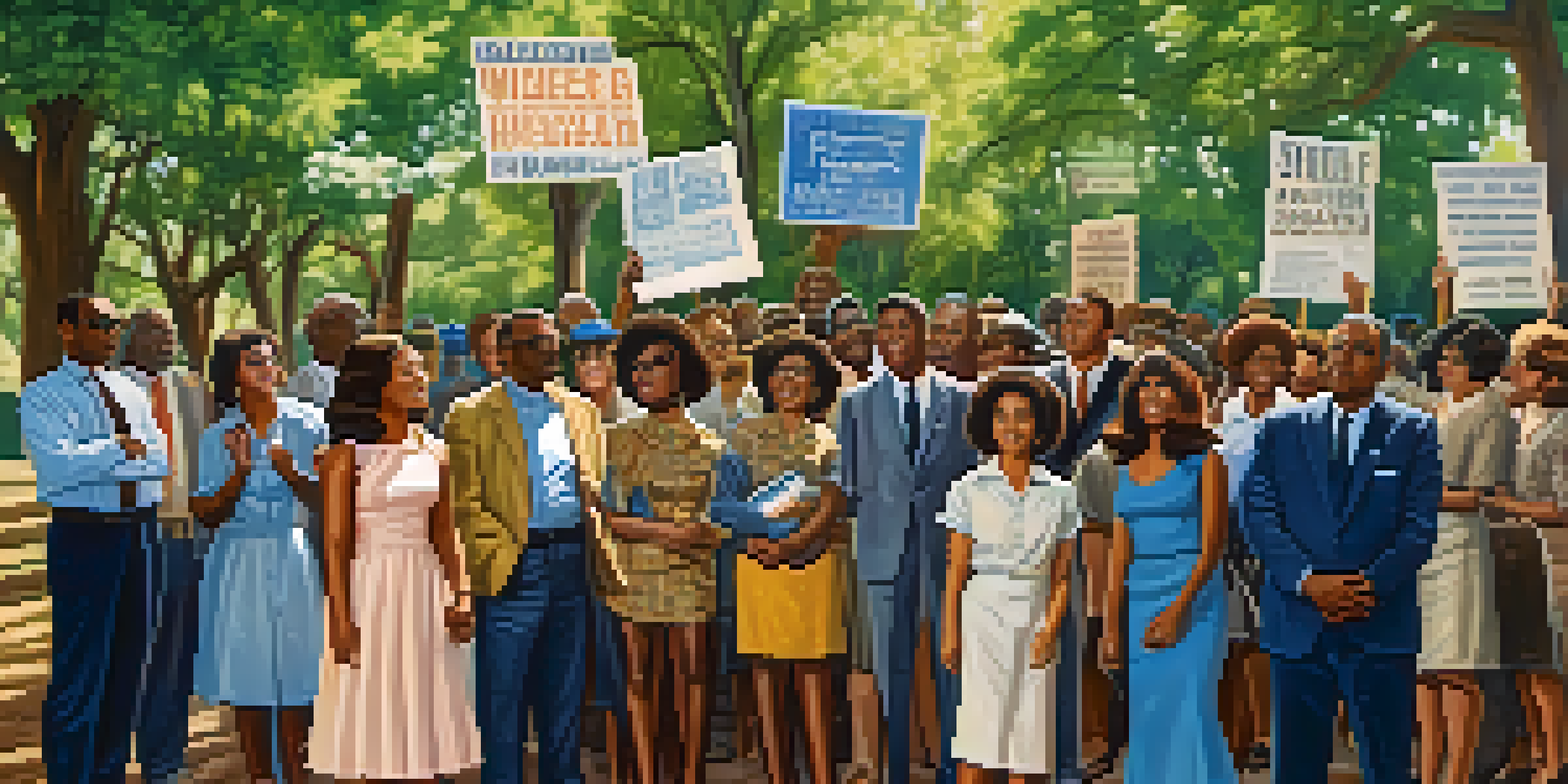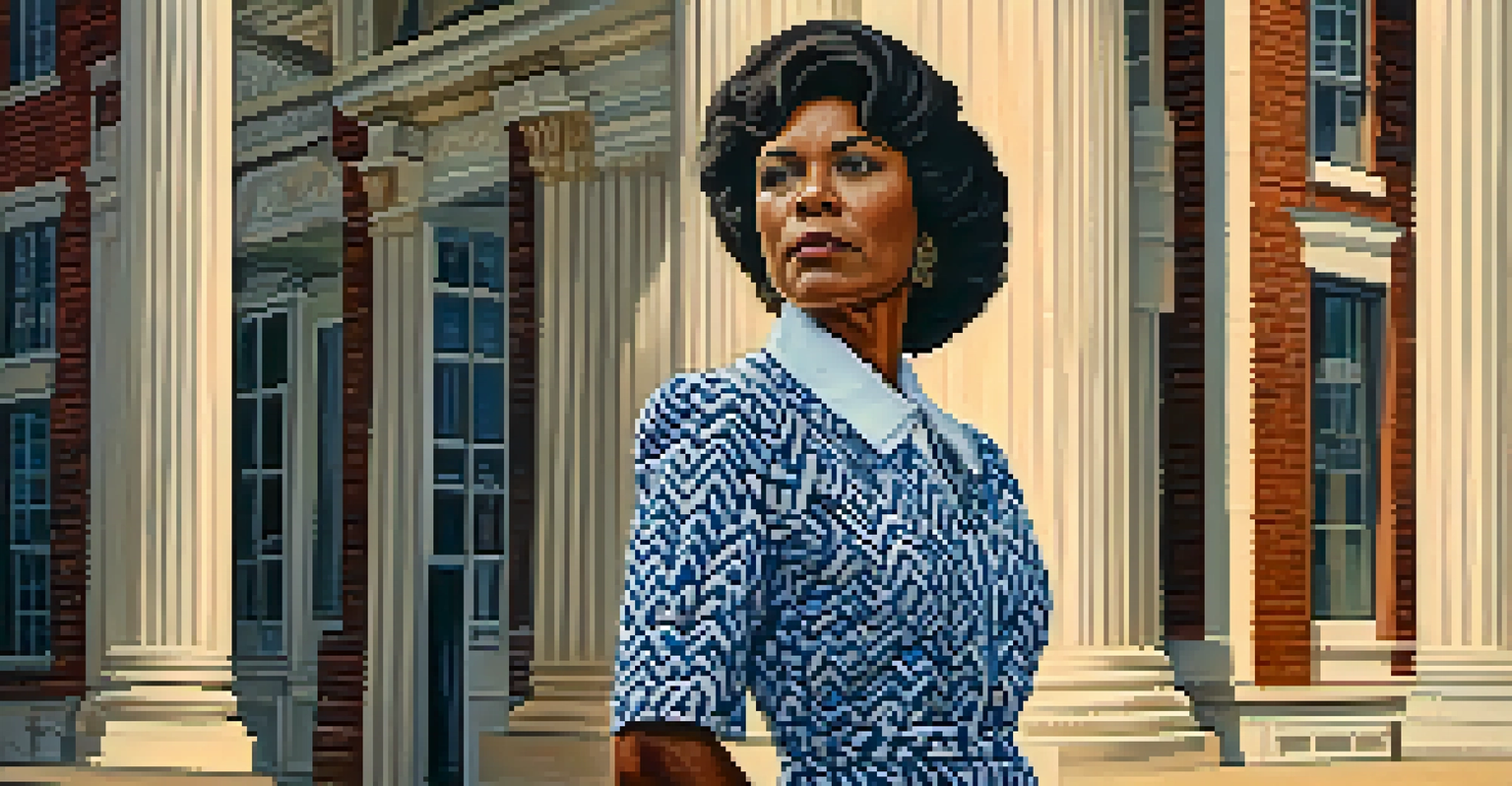Civil Rights Movements: Texas' Role in Social Change

The Early Foundations of Civil Rights in Texas
The Civil Rights Movement didn't just spring up overnight; it has deep roots in history. In Texas, early efforts can be traced back to the post-World War II era, when returning veterans sought equality and justice. The struggles of African Americans and Mexican Americans laid the groundwork for more organized movements in the following decades.
Injustice anywhere is a threat to justice everywhere.
During the 1940s and 1950s, key figures like Texas NAACP president, Juanita Craft, emerged, advocating for desegregation and voter rights. Craft's tireless efforts not only inspired others in Texas but also set the stage for national civil rights initiatives. These early foundations were critical in raising awareness and fostering a sense of community among marginalized groups.
As we look back, it's clear that these pioneers were not just fighting for their rights; they were igniting a flame that would lead to broader social change. The groundwork laid during this period created a fertile environment for the civil rights movements that followed, making Texas a crucial player in this transformative era.
The Chicano Movement: A Texas Perspective
While the African American struggle for civil rights was unfolding, another significant movement was gaining momentum: the Chicano Movement. In Texas, this movement sought to address issues like land rights, education, and social justice for Mexican Americans. Leaders like César Chávez and Dolores Huerta galvanized support for farmworkers' rights, highlighting the intersection of labor and civil rights.

Texas played a critical role in this movement, with rallies and protests taking place across the state. These events united people from various backgrounds, showcasing the power of community action. The Chicano Movement's influence extended beyond Texas, inspiring similar movements across the nation and emphasizing the importance of cultural identity.
Texas' Early Civil Rights Roots
The post-World War II era in Texas laid the groundwork for organized civil rights movements, driven by the struggles of African Americans and Mexican Americans.
The legacy of the Chicano Movement is evident today as Texas continues to celebrate its diverse heritage. This struggle for equality not only transformed the lives of Mexican Americans but also enriched the social fabric of the state, making it a vibrant part of the larger civil rights narrative.
The Fight for Black Civil Rights in Texas
The fight for Black civil rights in Texas saw significant milestones that echoed throughout the nation. Events like the 1960 sit-ins in segregated lunch counters marked a pivotal moment in Texas activism. These nonviolent protests aimed to dismantle segregation laws and highlighted the growing impatience for change among younger generations.
The time is always right to do what is right.
Key organizations, such as the Texas Southern University Student Nonviolent Coordinating Committee (SNCC), played a vital role in mobilizing students and community members. Their efforts not only brought attention to the injustices faced by Black Texans but also fostered a new wave of leadership within the civil rights movement. These grassroots efforts were instrumental in shaping policies that would later lead to the Civil Rights Act of 1964.
Today, the courage and determination exhibited during these protests serve as a reminder of the ongoing struggle for equality. The legacy of these activists continues to inspire new generations to advocate for social justice, proving that change often starts at the local level.
Women's Role in the Texas Civil Rights Movement
Women played an integral yet often overlooked role in the Texas civil rights movement. Figures like Juanita Craft and Beatrice H. Johnson not only fought for racial equality but also championed women's rights. Their leadership exemplified the intersectionality of civil rights, showing that the fight for justice encompasses multiple dimensions.
These women organized rallies, led voter registration drives, and worked tirelessly to combat discrimination. Their efforts were crucial in amplifying the voices of marginalized communities, demonstrating that social change requires collective action. The impact of their work is still felt today, as women's rights continue to be a focal point in ongoing civil rights discussions.
Chicano Movement's Impact
The Chicano Movement in Texas addressed social justice and cultural identity, significantly influencing both local and national civil rights initiatives.
Reflecting on their contributions invites us to recognize the importance of inclusive narratives in history. The stories of these remarkable women remind us that the civil rights movement was not solely a male endeavor; it was a collective fight that transcended gender and race.
The Legacy of Civil Rights Movements in Texas Education
The civil rights movements in Texas have left an indelible mark on the education system. Landmark cases like Hernandez v. Texas in 1954 challenged the exclusion of Mexican Americans from juries, ultimately influencing educational policies. These legal victories paved the way for greater access to quality education for all students, regardless of their background.
Incorporating civil rights history into the curriculum has become essential in Texas schools. Educators aim to create a more inclusive environment that reflects the diverse experiences of students. By teaching young Texans about their state's role in the civil rights struggle, we empower them to continue advocating for equality and justice.
The ongoing dialogue about equity in education underscores the importance of understanding our history. As Texas continues to evolve, the lessons learned from civil rights movements will remain a guiding force in shaping a more equitable future for all.
Modern Movements: Continuing the Fight for Equality
While the civil rights movements of the past laid the groundwork for change, modern movements continue to fight for equality in Texas. Issues such as immigration reform, police brutality, and LGBTQ+ rights remain at the forefront of social justice efforts. Activists across the state are drawing from historical lessons to address contemporary challenges.
Organizations like the Texas Civil Rights Project and local grassroots groups are mobilizing communities to advocate for change. Through protests, educational campaigns, and legal action, these activists are making their voices heard. The spirit of activism remains alive in Texas, proving that the fight for justice is far from over.
Modern Movements for Equality
Current social justice issues, such as immigration reform and police brutality, demonstrate the continued relevance of civil rights activism in Texas.
As we reflect on the ongoing struggles for equality, it's vital to support these movements and recognize their significance. The resilience of Texas activists serves as a reminder that social change is a continuous process, and each generation plays a pivotal role in shaping the future.
Looking Ahead: Texas and the Future of Civil Rights
As we look to the future, Texas will undoubtedly continue to play a vital role in the civil rights narrative. Emerging movements are addressing new issues, such as climate justice and economic inequality, reflecting the evolving landscape of social justice. These challenges require innovative solutions and a collective commitment to advocacy.
Engaging young people in civil rights discussions is crucial for sustaining momentum. By encouraging new generations to learn about their history and participate in activism, we ensure that the fight for equality remains vibrant. Texas' diverse population offers a unique perspective that can drive change on both local and national levels.

In conclusion, the legacy of civil rights movements in Texas is a testament to the power of collective action. As long as there are voices advocating for justice, the spirit of change will endure, making Texas a beacon of hope in the ongoing struggle for equality.